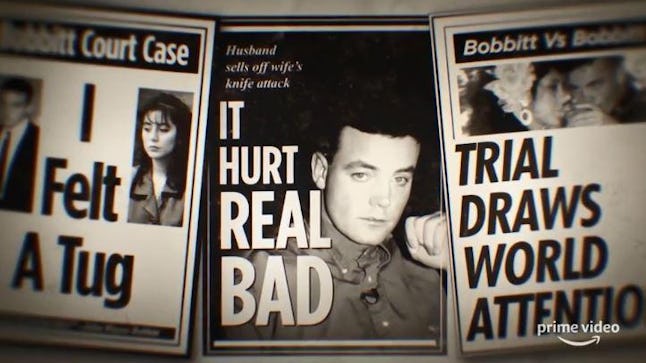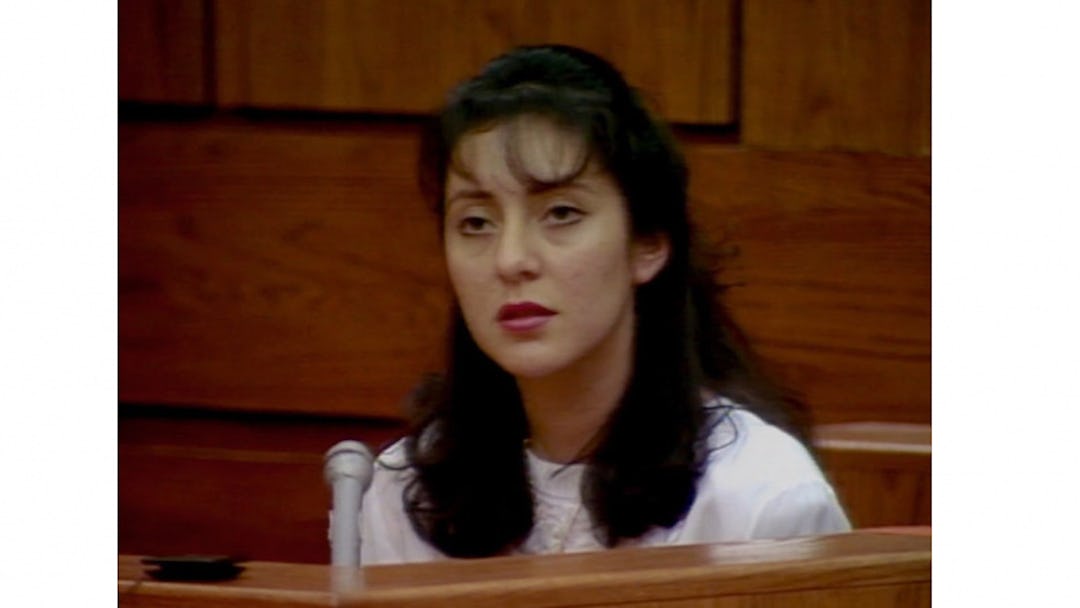The first two images of Lorena, Joshua Rofé’s new documentary series (debuting tomorrow on Amazon Prime) are tight shots of objects outside a home. The first is an American flag; the second is a satellite television dish. They are, in essence, what the movie is about, and if the placement isn’t exactly subtle, well, they’re telling the story of the woman who cut off her husband’s penis. Subtlety doesn’t really enter into it.
Her name was Lorena Bobbitt — these days, she goes by her maiden name of Gallo — and the first episode of Lorena, “The Night Of,” begins with what we (sort of) already know: how, on the night of June 23, 1993, the manicurist used a kitchen knife to remove her husband’s member, and then fled the scene, tossing it in a nearby field. Rofé talks to just about everyone involved — cops, doctors, nurses — and in the process, indulges in some of the same giggling and winking we all partook of, when this story broke. (“It hadn’t been found, it hadn’t been heard from, it was lost in action.”) Even she laughs about it herself. A little.
But this was not a funny story, and not only because of the graphic photos (all included here, of course). It was because of what prompted the crime: years of abuse and marital rape, culminating in an evening when Lorena had quite simply had enough, and took an action severe enough to ensure that husband John Wayne Bobbitt would never touch her again.

(Amazon)
In other words, Lorena is all of a piece with several recent works of non-fiction and docudrama — I, Tonya, the Clinton season of Slow Burn, The People vs. O.J. Simpson , and its most direct influence, the Oscar-winning O.J.: Made in America — that revisit the sleaziest, tabloid-friendliest stories of the 1990s, and not only reframe how we look and think about them, but indict the callous way we, as a culture, treated the women at their centers.
Lorena remembers that this story was the continuation of a conversation that was in progress throughout the early 1990s, from the testimony of Anita Hill to the trail of William Kennedy Smith to the horrifying allegations at Tailhook — front page stories that underlined, in a way quite rare in open conversation, the day-to-day dangers of simple existing in the world as a woman. So, contrary to its presentation, this was not an A-leads-to-B-leads-to-C cause/effect type of story; this was a tale filled with detours and backtracks, which Rofé and his editors elegantly replicated in the film’s ingenious structure.
To that end, she goes back and tells her full story in the second installment, “A Woman in Trouble,” which covers the period around their first trial — in which John was charged, and acquitted, of sexual assault — and the story’s domination of what is accurately dubbed “an evolving media landscape,” a swirling morass of CNN, tabloid press, and COURT TV. In delicately detailing how this story was told and framed, we’re reminded of the “Hot-blooded Latina” caricature that seemed so easy, and the cheap jokes that seemed so pervasive. And many of them were told by Mr. Bobbitt himself, who took the opportunity to transform himself into some kind of sad-sack pseudo-celebrity — famous not for any particular talent or charisma, but simply for being famous — most often via his appearances with Howard Stern. And, side note, I’d recommend anyone willfully participating in the latter-day lionization of Stern do their best to defend the radio clip in which he announces, “I didn’t buy this whole thing that he was raping her. She’s not even that good-looking.” I’d also like Stern to defend it, but who are we kidding.
(Amazon)
Stern’s grinning, elbow-in-the-ribs enabling of Wayne’s notoriety and faux-victimhood are particularly hard to swallow when viewing Lorena’s testimony, which (and here is an advantage of a docu-series running four hours) is presented here at great length, so powerful and so persuasive. It is, make no mistake, hard to watch, detailed descriptions of physical and sexual assault, and Lorena stays with her through this ordeal, as she searches for words and strength. The title of the third episode, “An Irresistible Impulse,” comes from the legal terminology embedded in her successful defense (a temporary insanity plea, basically); the fourth, “The Cycle of Abuse,” comes from the notion that this behavior comes from somewhere, and it’s worth trying to figure out where.
As with the closing episode of O.J., part four of Lorena spends a fair amount of time on its male antagonist’s cringe-inducing attempts to remain in the spotlight; in the case of John Wayne Bobbitt, this came in the form of job trouble, money trouble, more arrests, and porn. But to his credit, Rofé lets both of them have their say, though in the case of J.W., it’s very much a “give him enough rope to hang himself” situation; by the end of the series, Lorena has become, among other things, the portrait of a sociopath, a man who’s told so many lies for so long, it almost seems like he believes them himself. (He is, in the series’ least surprising revelation, a Trump guy.)
Lorena is an expertly crafted piece of work — this is a messy, complicated case, and Rofé and his team sift through a lot of information. If he leans a bit too hard on some of the tropes of the form (there are, as with most recent non-fiction films, too damn many drone shots), he also deploys them well; the reenactments are minimal and tasteful, and crisply intercut with the corresponding courtroom footage. Throughout the film, in fact, the juxtapositions are striking, and never more so than at the end, when Lorena reads aloud from the love letters John still sends her, and Lorena cuts away to the old but still affecting photos of the damage he did. And then she puts the letters down, scarcely believing their contents herself. “I cut his penis off!” she shrugs, not unreasonably. “Just leave me alone!”
Lorena debuts on Amazon Prime this Friday.
